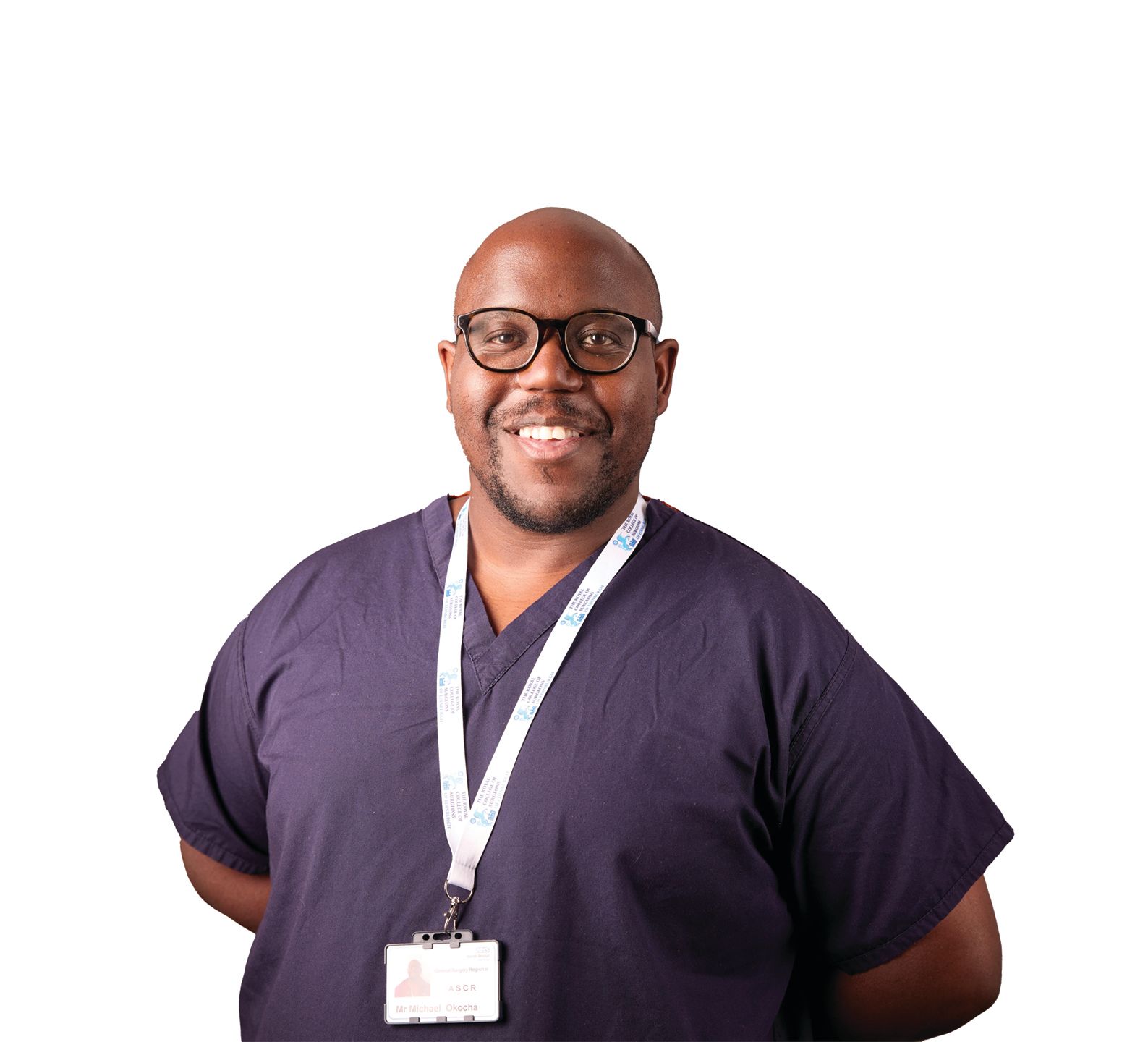“Finding the balance between life and training”
A message from Chair of the Trainees’ Committee Michael Okocha

I’m Michael, a Southwest ST7 colorectal trainee, currently based at St Mark’s National Bowel Hospital in London on a pelvic-floor fellowship. My journey into surgery has been shaped by a mix of curiosity, stubbornness and the occasional existential question about whether I’d have been better off as a hand model.
Surgical training has a way of pushing one’s limits, not just professionally but also personally – balancing clinical work, horrific dyslexia, four young children and exam preparation has been a juggling act best described as ‘character building’.
Over the years, I’ve held roles such as President of the Moynihan Academy and ASiT’s first Equality, Diversity and Inclusion Officer. I’ve also contributed to RCSEng and ASGBI committees, working on projects such as the Kennedy Report, NHS elective recovery and same-day emergency care strategies. These experiences have offered perspective though, I suspect, many of us share a similar impostor syndrome when sitting around large meeting tables, nodding thoughtfully while quietly wondering how we got there.
Extracurricular interests
Outside of work, I’m a collector of signed surgical textbooks and autobiographies – proof, perhaps, that even surgeons like to procrastinate productively. I’m also a biology enthusiast and once penned a slightly niche piece about bears and cholecystectomies. My hobbies
are mostly driven by a desire to escape from the relentlessness of modern surgical life, though I’ve yet to find a lucrative pastime that balances the mounting financial and mental pressures of training.
Looking ahead feels both daunting and exciting. Surgical training is at a crossroads. The pressures of service provision, the fear of loss of breadth of surgical practice, and the erosion of protected training time pose significant challenges. As trainees, we oscillate between striving to meet expectations and wondering if those expectations are sustainable. Confidence can be alluring but, sometimes, it feels as though the system is designed to test just how much we have.
Championing trainers
My focus will be on practical improvements: reducing the financial burdens of exams and training, lobbying for tax relief and exploring partnerships with industry to offset costs. I also want to champion recognition for trainers, whose time and effort often go unnoticed but are essential to our development. Protecting training opportunities is a priority – not just for trainees but also for patients.
In the coming months, we’ll publish guidance on safeguarding trainee opportunities, convene stakeholder meetings to address the practical realities of training and continue the important work of our incredible past Chair, Ms Katie Hurst, such as radiation protection for female trainees. We’ll also explore ways to better support medical students, ensuring they feel they belong in surgery – a sentiment many of us, at various points, have quietly wrestled with ourselves.
This is an uncertain but pivotal time for surgical trainees. I hope to contribute a steady hand and, perhaps, a touch of dry humour to the College’s work. Being a surgeon is a process of evolution – from physician to surgeon – where competence ebbs and flows. What I can offer is a commitment to advocate for better training, fairer conditions and a profession that we can all continue to take pride in.
I’m Michael, a Southwest ST7 colorectal trainee, currently based at St Mark’s National Bowel Hospital in London on a pelvic-floor fellowship. My journey into surgery has been shaped by a mix of curiosity, stubbornness and the occasional existential question about whether I’d have been better off as a hand model.
Surgical training has a way of pushing one’s limits, not just professionally but also personally – balancing clinical work, horrific dyslexia, four young children and exam preparation has been a juggling act best described as ‘character building’.
Over the years, I’ve held roles such as President of the Moynihan Academy and ASiT’s first Equality, Diversity and Inclusion Officer. I’ve also contributed to RCSEng and ASGBI committees, working on projects such as the Kennedy Report, NHS elective recovery and same-day emergency care strategies. These experiences have offered perspective though, I suspect, many of us share a similar impostor syndrome when sitting around large meeting tables, nodding thoughtfully while quietly wondering how we got there.
Extracurricular interests
Outside of work, I’m a collector of signed surgical textbooks and autobiographies – proof, perhaps, that even surgeons like to procrastinate productively. I’m also a biology enthusiast and once penned a slightly niche piece about bears and cholecystectomies. My hobbies
are mostly driven by a desire to escape from the relentlessness of modern surgical life, though I’ve yet to find a lucrative pastime that balances the mounting financial and mental pressures of training.
Looking ahead feels both daunting and exciting. Surgical training is at a crossroads. The pressures of service provision, the fear of loss of breadth of surgical practice, and the erosion of protected training time pose significant challenges. As trainees, we oscillate between striving to meet expectations and wondering if those expectations are sustainable. Confidence can be alluring but, sometimes, it feels as though the system is designed to test just how much we have.
Championing trainers
My focus will be on practical improvements: reducing the financial burdens of exams and training, lobbying for tax relief and exploring partnerships with industry to offset costs. I also want to champion recognition for trainers, whose time and effort often go unnoticed but are essential to our development. Protecting training opportunities is a priority – not just for trainees but also for patients.
In the coming months, we’ll publish guidance on safeguarding trainee opportunities, convene stakeholder meetings to address the practical realities of training and continue the important work of our incredible past Chair, Ms Katie Hurst, such as radiation protection for female trainees. We’ll also explore ways to better support medical students, ensuring they feel they belong in surgery – a sentiment many of us, at various points, have quietly wrestled with ourselves.
This is an uncertain but pivotal time for surgical trainees. I hope to contribute a steady hand and, perhaps, a touch of dry humour to the College’s work. Being a surgeon is a process of evolution – from physician to surgeon – where competence ebbs and flows. What I can offer is a commitment to advocate for better training, fairer conditions and a profession that we can all continue to take pride in.
Read more



